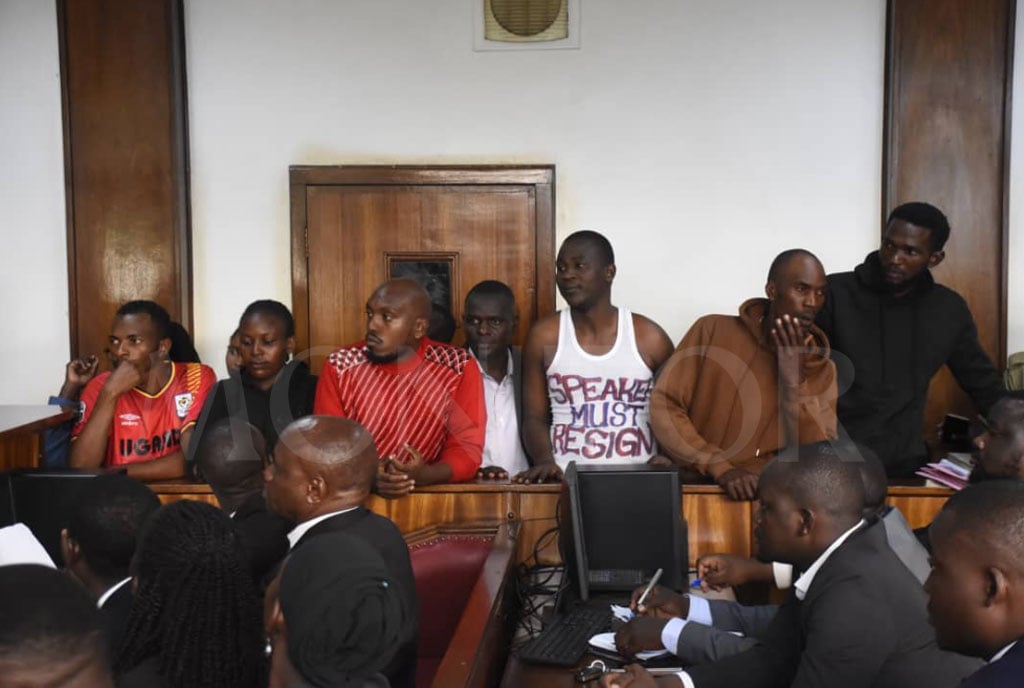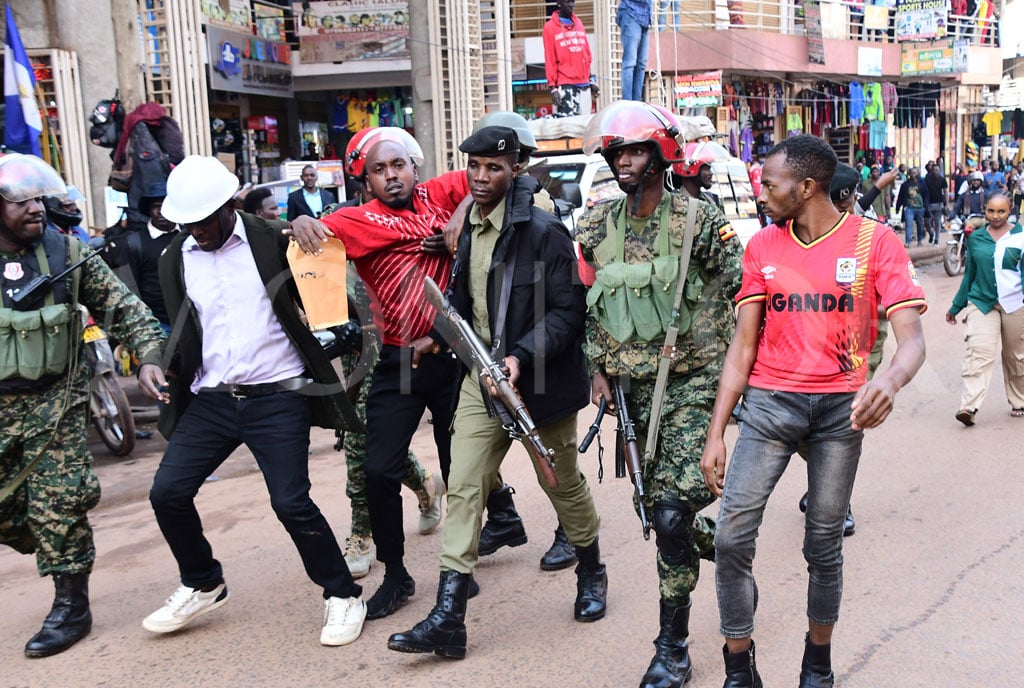
Some of the July 23, 2024 March to Parliament protesters are seen in the dock at Buganda Road Chief Magistrates' Court on the same day. PHOTO/ISAAC KASAMANI
It is not clear if it was a political move, but five years ago, President Museveni ordered a pardon of street vendors who had been arrested by police during a clampdown on people thought to be idle.
Mr Museveni, who directed the government’s chief legal advisor, the Attorney General, and the Inspector General of Police to do the needful, derided the law on account of it being the product of a colonial fear of Africans. He consequently ordered the release of all people jailed for being idle and disorderly.

Seated left to Right: Deputy Chief Justice Richard Buteera, Speaker of Parliament Anita Among, President Museveni, Chief Justice Alfonse Owiny-Dollo, Justice and Constitutional Affairs minister Norbert Mao, and prosecutors led by the Director of Public Prosecutions, Justice Jane Frances Abodo, during 7th Joan Kagezi Memorial Lecture in Kampala recently. PHOTO/DPP
Mr Museveni’s order also directed the Director of Public Prosecutions (DPP) to terminate all such cases pending in courts of law.
“Why should this be a crime? If I am unemployed and I hang about the park, why should somebody accuse me of the crime of hanging around? It was the colonialists who feared that Africans were around who drafted that law. It should be repealed,” the President said, adding that street vendors and hawkers serving jail sentences for selling clothes, food, trinkets, spices, fruits and household goods on the pavements in the capital, Kampala, should be released.
Mr Museveni proceeded to note thus: “All people who have been arrested on account of this nonsensical crime should be released immediately and all prosecution discontinued because, in any case, the police and courts have got more real crimes that they need to deal with (murder, rape, robbery, embezzlement, etc.).”
Red-flagged
In 2022, the Constitutional Court, following a petition by a private citizen, Francis Tumwesigye Ateenyi, nullified the section of the Penal Code which provided that “any suspect or reputed thief with no visible means of subsistence shall be deemed a rogue and vagabond and commits an offence punishable with imprisonment.” The nullification was on the grounds that it contravened various sections of the Constitution.

Some of the anti-graft protesters who were charged at Buganda Road Court and remanded to Luzira Prison on July 23, 2024. Photo | Abubaker Lubowa
Justice Frederick Martin Egonda-Ntende, who wrote the lead judgement, said sections 168 (1) (C) and 168 (1) (d) that provided for offences of idle and disorderly are unconstitutional insofar as they fail to provide a precise definition for the offences they create, thereby violating Article 28 (12) of the Constitution on the principle of legality. The judge also knocked down the charges on grounds that they were contrary to the presumption of innocence in Article 28 (3) (a). This as they reversed the burden of proof, imposing it on the accused person instead.
“It must be noted that presumption of innocence is a constituent element of the right to fair trial … There is an absolute bar imposed by the Constitution against whittling away or diminishing the content of the right to a fair trial,” Justice Egonda-Ntende ruled.
In the aftermath of giving out the judgement, the police issued a statement acknowledging the judgement.
“The leadership of the police has acknowledged the Constitutional Court ruling that repealed and decriminalised the petty offence of rogues and vagabonds, from the Penal Code Act, after it was found to be vague, archaic and unconstitutional. All police officers have, with immediate effect, been tasked to fully comply with the ruling, and stop any arrests for the minor infractions of rogues and vagabonds,” Fred Enanga, then the police spokesperson, said.
Draconian provisions
Two years after the Constitutional Court nullified the law, Mr Museveni told Ugandan youth before they ultimately opted to engage in protests against corruption on Tuesday that they were playing with fire.
“My question is what right then do you have to seek to generate chaotic behaviour? What right do you have?” Museveni said in a televised address on Saturday, adding: “We are busy producing wealth. You’re getting cheap food. Other people in other parts of the world are starving. They are crying of hunger here. You want to disturb us: You are playing with fire because we can’t allow you to disturb us. When you demonstrate in a place like Kampala, people are selling on the roadside. Are you going to step into people’s products? Don’t have such ideas in your head.”

Police arrest demonstrators outside Parliament on July 23, 2024 during the anti-graft March to Parliament protest. PHOTO/ ISAAC KASAMANI.
Museveni advised the protesters that if they want to protest, they should contact Edith Nakalema, the head of the State House Investors Anti-Corruption Unit.
“They should get a day when there is no traffic in the centre. You can go to Kololo and talk about whatever you want to talk about nicely, but don’t be tempted to bring chaos or to step on people’s things on the road,” he advised.
Despite the stern warning by Museveni, who has been in power since 1986, dozens of youths went ahead to carry out peaceful protests on Tuesday. Figures collated by independent sources, which we were unable to confirm, show that more than 100 arrests were made, with the State opting to prefer charges ranging from common nuisance to idle and disorderly against some of the protesters. While the former is a draconian provision in the Penal Code Act, the latter, as earlier pointed out, was condemned and the Constitutional Court nullified it.

A combination of photos shows security operatives arresting young demonstrators during the March to Parliament anti-graft protest in Kampala on July 23, 2024.
The laws originate from the 14th Century British laws and they were introduced to Uganda in 1950, years after Britain had asserted itself as its colonial master. East African countries such as Kenya and Tanzania have nullified the law that in most cases is used to target sex workers, street dwellers, drug users, beggars and hawkers, who are sometimes referred to as vagabonds.
A worrying trend
On Tuesday, barely after the dust raised by the protests had settled, and with the State running out of charges to prefer against the youthful protesters, it turned to a provision that had been nullified.
The magistrates weren’t willing to listen to any objections from the accused’s lawyers. The State, of recent, has made it a habit to arraign its vocal critics in court, preferring any charge against them before remanding them for a lengthy period.
Families of the youthful protesters will, doubtlessly, have a chill shoot through their collective spine when they see the fate that has befallen former Rubaga Division Deputy Resident City Commissioner (RCC), Hebert Anderson Burora. This after he launched an anti-corruption campaign aimed at Anita Among, the House Speaker.

Former Rubaga deputy Resident City Commissioner Anderson Herbert Burora in the dock at Buganda Road Court. PHOTO | ABUBAKER LUBOWA
Burora was first charged with hate speech and spreading malicious information, with Speaker Among being the complainant. His charge sheet was later amended to add six new charges, which all emerge from comments he made against the House Speaker.
The first attempt by Burora’s lawyers to throw out the charges on the account of a defective charge sheet was not successful. Roland Kayizzi, the Buganda Road Chief Magistrate, roundly dismissed the attempt to throw out the charges, saying they complied with sections 85 and 88 of the Magistrate’s Court Act (MCA). He then accused Burora’s legal team of using the wrong strategy to fight the charges.
“I hold a view that the priority of the defence legal team would have been to apply for bail for their client and then object to the legality of the charge sheet. This court, therefore, can’t be blamed for the continued incarceration of the accused person who has never applied for bail,” Mr Kayizzi said.
Delaying tactics?
Although Mr Kayizzi said the court couldn’t be held responsible for Burora’s incarceration when his bail application came for hearing on July 12, the Buganda Road Chief Magistrate was away in training. He duly sent in a stand-in magistrate, who could only adjourn the case.
The same delaying tactics were on display when some of the youthful protesters were arraigned in the court after their arrest on Tuesday. Although they had in place legal representation and sureties, the magistrate at Nakawa Chief Magistrates Court told them it was 5pm and she couldn’t handle their bail applications.
At Buganda Road Chief Magistrate’s Court, where most of the protesters were arraigned, the magistrate was more interested in defence lawyers proving that the accused had given them instructions rather than hearing the bail application itself. The magistrates later remanded the accused to Luzira prison until days between July 30 and August 6.
“There’s no point in applying for bail in a court whose practice is to remand. Remand as a punishment, appeasement of an angry public, appeasement of complainants, a tool in public humiliation,” lawyer Isaac Kimaze Ssemakadde told Monitor in an interview.
It is something that Latif Madoi, an avant-garde fashion designer, who counts Robert Kyagulanyi Ssentamu, alias Bobi Wine, among his clients, can identify with. Mr Madoi was arrested when security forces descended on his Latif Academy Talent School on May 13. He was denied bail, and ended up losing dreadlocks he had been growing for 17 years during his incarceration. Mr Madoi was released at the back end of last month but will be due back in court on Monday (July 29).
About bail
The temporary release of an accused person awaiting trial, sometimes on condition that a sum of money is lodged to guarantee their appearance in court.




